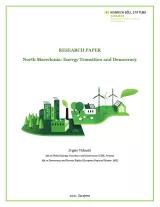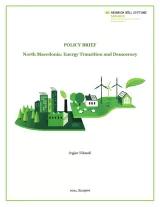European Green Deal
What is the European Green Deal and what are the consequences and opportunities for Bosnia and Herzegovina and the Western Balkans?
The European Green Deal is the EU's response to climate change. It is a new European development strategy aimed at transforming the EU into a just and prosperous society with a modern, efficient and competitive economy with zero net greenhouse gas emissions by 2050 through investment in environmental research and innovation. The EU aims to transform its society and economy to make them sustainable, to protect and preserve natural resources, to protect the health and well-being of citizens from environmental risks and to make a socially just transition so that no individual or region can be set up. Namely, the Green Dealputs people first and pays special attention to the regions, industry and workers who will face the biggest challenges.
Decarbonising the energy sector in general with clean, affordable and secure energy is paramount to achieving the 2030 and 2050 climate targets. More than 75% of EU greenhouse gas emissions are the result of energy production and use processes and therefore energy efficiency will become a priority. The electricity sector will have to weaken mostly on renewables, with a gradual cessation of coal use and a reduction in carbon dioxide. To achieve climate-neutral, circular economies and sustainable industries, it is intended to transform the entire industrial sector in the next 25 years.
Sustainable agriculture "From the field to the table" and the sustainability of mobility also occupy a very important place in the European Green Deal. In short, from now on, all public policies in the EU will have to be viewed through the prism of sustainability. Bosnia and Herzegovina, like other Western Balkan countries, is not a member of the EU, but that does not mean that these measures do not apply to them. Namely, the EU is currently considering how to adapt the Green Deal to the Western Balkans, where environmental policy is in the hands of corrupt ruling elites, which are not regulated by pollutants, do not encourage clean energy and transport, but continue their dependence on coal and other fossil fuels.
One of the measures currently being considered in the EU in response to an uncertain environmental policy in the Western Balkans is the introduction of a carbon tax, which could be a major blow to electricity prices and the weather export competitiveness of power companies in the region. Such a move might hit the possibility of exporting electricity from Bosnia and Herzegovina the hardest. The intention to respect the Paris Agreement will be an essential element for all future trade agreements and relations. The aim of this dossier is to provide insight into the political work of the Heinrich Böll Foundation in the field of green transformations in BiH, Albania and Northern Macedonia. Through a selection of texts and analyzes, we will try to present some of the most important elements of the European Green Deal, and in this context the challenges that these countries will have to face in the future.
The Wester Balkan Countries all aspire to membership in the European Union and have recently re-affirmed their commitment to joining European Union in the race to climate neutrality by 2050 by signing up to the EU's Green Agenda for the Western Balkans. However, countries rely mostly on coal and oil for their primary energy supply. Renewables also take part in the energy mix primarily through traditional use of biomass in inefficient domestic devices followed by large hydro. Modern sources of renewable energy are at an early stage of development. Energy and carbon intensity of the region is comparatively high both to the EU and the World average values.
The factsheets and brochure give lot of information on the status of energy transition in the WB countries.








